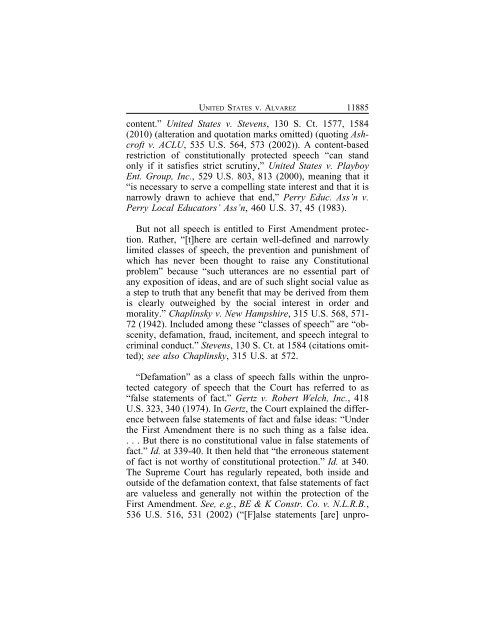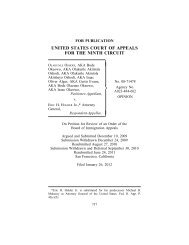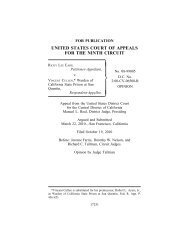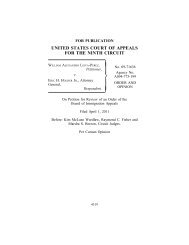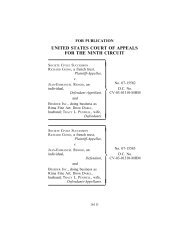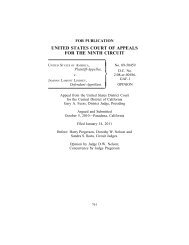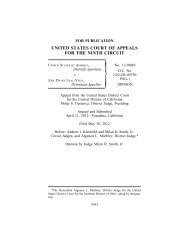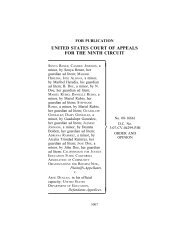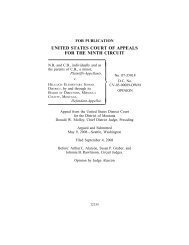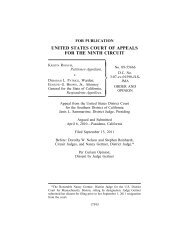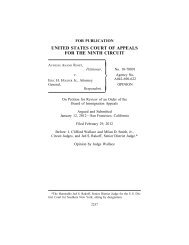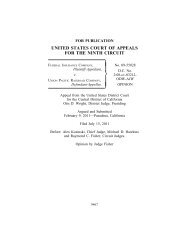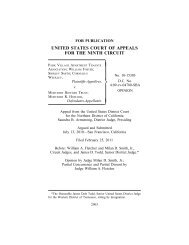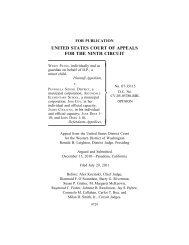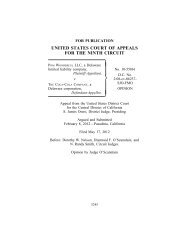USA v. Xavier Alvarez - Ninth Circuit Court of Appeals
USA v. Xavier Alvarez - Ninth Circuit Court of Appeals
USA v. Xavier Alvarez - Ninth Circuit Court of Appeals
Create successful ePaper yourself
Turn your PDF publications into a flip-book with our unique Google optimized e-Paper software.
UNITED STATES v. ALVAREZ<br />
11885<br />
content.” United States v. Stevens, 130 S. Ct. 1577, 1584<br />
(2010) (alteration and quotation marks omitted) (quoting Ashcr<strong>of</strong>t<br />
v. ACLU, 535 U.S. 564, 573 (2002)). A content-based<br />
restriction <strong>of</strong> constitutionally protected speech “can stand<br />
only if it satisfies strict scrutiny,” United States v. Playboy<br />
Ent. Group, Inc., 529 U.S. 803, 813 (2000), meaning that it<br />
“is necessary to serve a compelling state interest and that it is<br />
narrowly drawn to achieve that end,” Perry Educ. Ass’n v.<br />
Perry Local Educators’ Ass’n, 460 U.S. 37, 45 (1983).<br />
But not all speech is entitled to First Amendment protection.<br />
Rather, “[t]here are certain well-defined and narrowly<br />
limited classes <strong>of</strong> speech, the prevention and punishment <strong>of</strong><br />
which has never been thought to raise any Constitutional<br />
problem” because “such utterances are no essential part <strong>of</strong><br />
any exposition <strong>of</strong> ideas, and are <strong>of</strong> such slight social value as<br />
a step to truth that any benefit that may be derived from them<br />
is clearly outweighed by the social interest in order and<br />
morality.” Chaplinsky v. New Hampshire, 315 U.S. 568, 571-<br />
72 (1942). Included among these “classes <strong>of</strong> speech” are “obscenity,<br />
defamation, fraud, incitement, and speech integral to<br />
criminal conduct.” Stevens, 130 S. Ct. at 1584 (citations omitted);<br />
see also Chaplinsky, 315 U.S. at 572.<br />
“Defamation” as a class <strong>of</strong> speech falls within the unprotected<br />
category <strong>of</strong> speech that the <strong>Court</strong> has referred to as<br />
“false statements <strong>of</strong> fact.” Gertz v. Robert Welch, Inc., 418<br />
U.S. 323, 340 (1974). In Gertz, the <strong>Court</strong> explained the difference<br />
between false statements <strong>of</strong> fact and false ideas: “Under<br />
the First Amendment there is no such thing as a false idea.<br />
. . . But there is no constitutional value in false statements <strong>of</strong><br />
fact.” Id. at 339-40. It then held that “the erroneous statement<br />
<strong>of</strong> fact is not worthy <strong>of</strong> constitutional protection.” Id. at 340.<br />
The Supreme <strong>Court</strong> has regularly repeated, both inside and<br />
outside <strong>of</strong> the defamation context, that false statements <strong>of</strong> fact<br />
are valueless and generally not within the protection <strong>of</strong> the<br />
First Amendment. See, e.g., BE & K Constr. Co. v. N.L.R.B.,<br />
536 U.S. 516, 531 (2002) (“[F]alse statements [are] unpro-


